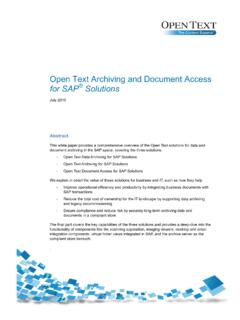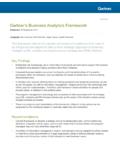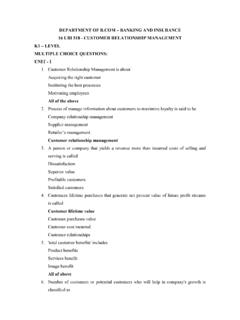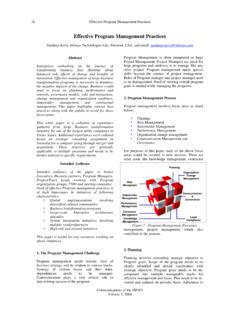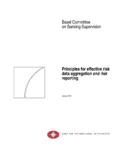Transcription of PERFORMANCE BENCHMARK POSTGRESQL / MONGODB
1 PERFORMANCE BENCHMARKPOSTGRESQL / MONGODBPERFORMANCE BENCHMARKPOSTGRESQL / MONGODB2/46// CONTENTS // ABOUT THIS BENCHMARK 3 Introduction 3 OnGres Ethics Policy 4 Authors 4// EXECUTIVE SUMMARY. BENCHMARKS KEY FINDINGS 5 Transactions BENCHMARK 5 OLTP BENCHMARK 6 OLAP BENCHMARK 6// METHODOLOGY AND BENCHMARKS 7 Introduction and objectives 7 Benchmarks performed 7 About the technologies involved 8 Automated infrastructure 9// TRANSACTIONS BENCHMARK 12 BENCHMARK description 12 MONGODB transaction limitations 14 Discussion on transaction isolation levels 14 BENCHMARK results 17// OLTP BENCHMARK 25 BENCHMARK description 25 Initial considerations 26 BENCHMARK results 29// OLAP BENCHMARK 38 BENCHMARK description 38 BENCHMARK results 45
2 PERFORMANCE BENCHMARKPOSTGRESQL / MONGODB3/46// ABOUT THIS BENCHMARKI ntroductionBenchmarking is hard. Benchmarking databases, harder. Benchmarking databases that follow different approaches (relational vs document) is even harder. There are many reasons why this is true, widely discussed in the all these difficulties, the market demands these kinds of benchmarks. Despite the different data models that MONGODB and POSTGRESQL expose, many developers and organizations face a challenge when choosing between the platforms.
3 And while they can be compared on many fronts, PERFORMANCE is undoubtedly one of the main differentiators arguably the main one. How then do you leverage an informative BENCHMARK so that decisions can be made about the choice of a given technology, while at the same time presenting a fair arena in which the technologies compete in an apples-to-apples scenario? To fulfill these goals, this BENCHMARK has been executed based on the following criteria: Transparency and reproducibility. The framework that has been programmed and used to run the benchmarks is fully automated and is published as open source.
4 Anyone may use the same tools, and reproduce the same results. Or change parameters and configurations and derive your own. Since it is designed to run on a public cloud, it s available to anyone. Both public and generated datasets have been used. Multiple benchmarks. Picking a single BENCHMARK or BENCHMARK type presents results only from one perspective. This BENCHMARK includes tests on OLTP-like workloads, OLAP-like workloads, and benchmarks specific to transactions. Fairness. It s hard to assess fairness, especially when one database is more native on a given test or BENCHMARK technology.
5 But both databases are quite multi-modal as of today: POSTGRESQL supports documents with its jsonb data type, and MONGODB supports relational workloads with its joins ($lookup) and transaction support. Similarly, there are benchmarks that are more suited for one or the other model. The exercised features are then only those that are common across databases and/or clearly advertised as such. Detailed analysis. This white paper includes a detailed analysis of each result. All the tests were run with system monitoring information in parallel, to capture runtime information that may help inform the results BENCHMARKPOSTGRESQL / MONGODB4/46 OnGres Ethics PolicyThis BENCHMARK was conducted by OnGres ( ), according to OnGres Ethics Policy.
6 EnterpriseDB ( ) sponsored the policy guarantees that the following requisites are observed: No technology is favored over another. No results are edited or omitted. The sponsor of the work does not intervene in the strategy, implementation or execution of the work. Results are verifiable by external, third parties. All the work is conducted with the maximum degree of professionalism and OnGres is a company expert in POSTGRESQL , and as such may show a higher degree of knowledge of Postgres-based Director: lvaro Hern ndez Tortosa and developers: Francis del Carmen Santiago Cerme o, Emanuel Calvo, Gerardo Herzig, Sergio Alejandro Ostapowicz, Matteo Melli, Jorge Daniel Fern BENCHMARKPOSTGRESQL / MONGODB5/46// EXECUTIVE SUMMARY.
7 BENCHMARKS KEY FINDINGSThe goal of this BENCHMARK project is to compare the PERFORMANCE of POSTGRESQL and MONGODB Community Server on several different workloads, while trying to make them resemble production scenarios as much as possible. Another goal of the BENCHMARK is to automate all the BENCHMARK infrastructure so that results can be easily reproduced by third parties. All the software has been published as open benchmarks have been considered: Transaction BENCHMARK . A custom-developed BENCHMARK , inspired by MONGODB Pymongo-Transactions Project, that models an airline reservation system.
8 Sysbench for OLTP workloads, considering both in-memory and 2TB datasets. A JSON-based OLAP BENCHMARK measuring query PERFORMANCE on four custom-written queries over 1 year of GitHub archive data, using jsonb in 11 was found to be faster than MONGODB in almost every BENCHMARK . Throughput was higher, ranging from dozens of percent points up to one and even two orders of magnitude on some benchmarks. Latency, when measured by the BENCHMARK , was also lower on detailed findings for the three benchmarks can be summarized as follows in the next BENCHMARK MONGODB without using transactions runs on the equivalent of READ UNCOMMITTED isolation mode.
9 This allows phenomena like non-consistent reads, skipped documents on a query or reading data that is not durable to happen. Avoiding these inconsistencies puts significant burden on the application developer. MONGODB with transactions offers SERIALIZABLE isolation guarantees. POSTGRESQL has been tested both with READ COMMITTED and SERIALIZABLE isolation levels. MONGODB was found to be one order of magnitude (4x-15x) slower than POSTGRESQL on READ COMMITTED; or 4-14x slower compared to POSTGRESQL on SERIALIZABLE when comparing exactly the same level of isolation guarantees provided.
10 POSTGRESQL SERIALIZABLE is a bit slower than READ COMMITTED, but not by much. POSTGRESQL processes more than 20 thousand transactions per second when MONGODB doesn t reach 2 BENCHMARKPOSTGRESQL / MONGODB6/46 POSTGRESQL latencies are under 50ms for the 99% percentile, and as low as less than 1 millisecond. Under all concurrency levels, half of the transactions (median) take less than 10ms. MONGODB latencies are significantly higher: median latency is 5-20 times higher than that of POSTGRESQL ; and 99 percentile is 7-17 times worse.




